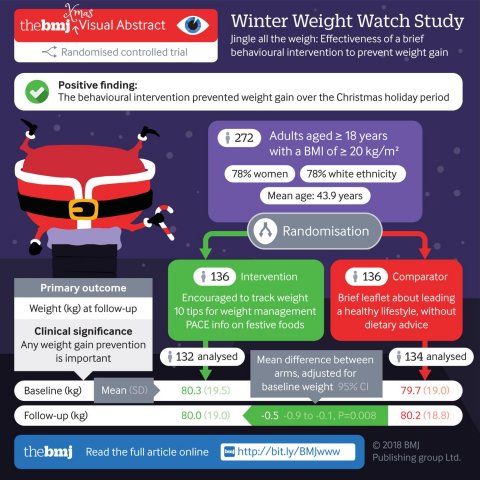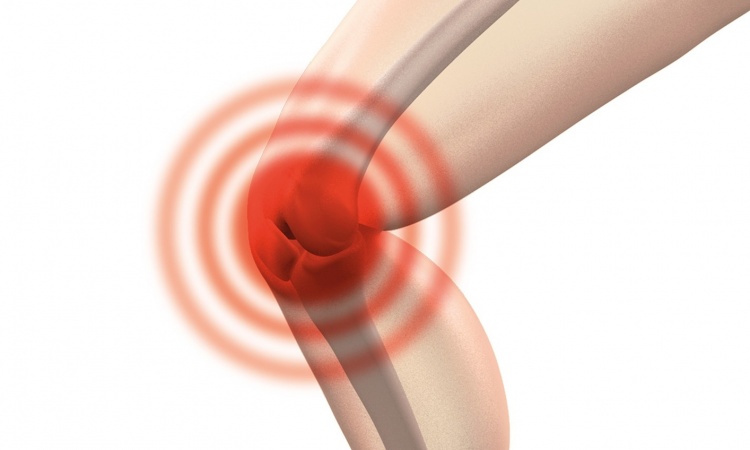News • 'Tis the season to be healthy
10 simple tips to keep Christmas overindulgence at bay
A study by the University of Birmingham and Loughborough University has shown that regular weighing at home and simple tips to curb excess eating and drinking can prevent people from piling on the pounds at Christmas.
Source: Pexels/Dana Tentis
Researchers, supported by the National Institute for Health Research (NIHR) and funded by the University of Birmingham, carried out the ‘Winter Weight Watch Study’ - a trial that aimed to prevent participants from gaining weight over the festive season by arming them with tips and techniques to avoid overindulging.
It saw 272 volunteers being randomly placed into either an ‘intervention’ or a ‘comparison’ group. Those in the intervention group were asked to weigh themselves at least twice per week, but ideally every day, and record their weight on a record card to help them monitor their food and drink intake. They were also given 10 top tips for weight management and a list of how much physical activity would be needed to burn off calories found in popular food and drinks consumed at Christmas. For example, it takes 21 minutes of running to burn the calories in a mince pie and 33 minutes of walking to expend the calories found in a small glass of mulled wine. In contrast, the comparison group received only a brief information leaflet about leading a healthy lifestyle, which did not include dietary advice.
The study, published in The BMJ, was carried out in 2016 and 2017, with participants weighed and measured in November and December each year and then follow-up measurements taken in January and February 2017 and 2018.
These 10 tips were given to the participants of the study:
- Keep to your meal routine: Try to eat roughly the same time each day, whether this is two or five times a day.
- Go reduced fat: Choose reduced fat foods (e.g. dairy foods, spreads, salad dressings) where you can. Use high fat food sparingly (e.g. butter and oils), if at all.
- Walk off the weight: Walk 10,000 steps each day (equivalent to 60-90 minutes of moderate activity). You can use a pedometer to help you count the steps. Start by counting your steps, then building up more each day with an ultimate target of 10,000.
- Pack a healthy snack: If you snack, choose a healthy option such as fresh fruit or low calorie yogurts instead of chocolate or crisps.
- Learn the labels: Be careful about food claims. Check the fat and sugar on food labels when shopping and preparing food. Be aware of what the higher fat and sugar foods are.
- Caution with your portions: Do not heap food on your plate (except vegetables). Think twice before having second helpings.
- Up on your feet: Break up your sitting time. Stand up for 10 minutes out of every hour.
- Think about your drinks: Choose water or sugar free squashes. Unsweetened fruit juice contains natural sugar so limit to one glass a day (200ml; one third of a pint). Alcohol is high in calories so limit to one unit per day for women and two for men. Try diluting your drinks with water, soda or low calorie mixers.
- Focus on your food: Slow down. Do not eat on the go or while watching TV. Eat at a table if possible. Enjoy your food.
- Do not forget your 5 a day: Eat at least five portions of fruit and vegetables a day (400g in total). Try something new! Frozen and tinned (in water) count too.
Adapted from: Lally et al (2008), International Journal of Obesity 32; 700-707

Source: Picjumbo/Viktor Hanacek
On Christmas Day alone an individual might consume 6,000 calories - three times the recommended daily allowance
Frances Mason
The results showed that on average, participants in the comparison group gained some weight over Christmas but participants in the intervention group did not. Those in the intervention group ended the study weighing on average 0.49kg less than those in the comparison group. Following the intervention, compared with the comparison group participants in the intervention group were assessed to be more able to restrain their eating and drinking to help control their body weight.
First author Frances Mason, of the University of Birmingham’s Institute of Applied Health Research, said: “The festive season coincides with public holidays in many countries, providing an opportunity for prolonged over-consumption and sedentary behaviour. On Christmas Day alone an individual might consume 6,000 calories - three times the recommended daily allowance. Christmas is likely to tax even the most experienced weight controller. Low intensity interventions such as the one used in our Winter Weight Watch Study should be considered by health policy makers to prevent weight gain in the population during high-risk periods such as holidays.”

Senior author Professor Amanda Daley, with the School of Sport, Exercise and Health Sciences at Loughborough University, said: “On average people gain a small amount of weight of up to 1kg each year and holidays such as Christmas are responsible for most of this annual weight gain. Weight gained during holiday periods often is not subsequently lost and, although these gains are small, over 10 years they would lead to a significant increase in body weight. Our research has shown that a brief intervention over the Christmas period can help to prevent these small weight gains that accumulate and drive the obesity epidemic.”
Few trials have tested interventions to prevent weight gain during high risk periods, and this is the first known trial to test a strategy for preventing weight gain at Christmas.
Corresponding author Dr Amanda Farley, lecturer in public health and epidemiology at the University of Birmingham, said: “The results of this study are encouraging. The information given to participants was tailored to the local cultural context but could also easily be adapted for use in other settings and countries. Miranda Pallan, senior clinical lecturer in public health at the University of Birmingham, also authored the research. The statistical work of the study was carried out by Alice Sitch and Christina Easter, also of the University of Birmingham’s Institute of Applied Health Research.
Source: University of Birmingham
15.12.2018










